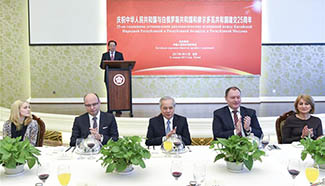BEIJING, Jan. 11 (Xinhua) -- China will enhance regulations for regional equity market to boost its role in diversified financing channels for the country's medium-, small- and micro-sized businesses and encourage private investment.
The State Council's executive meeting on Wednesday chaired by Premier Li Keqiang approved a set of regulations updates.
The new regulation makes clear regional equity market's mandate as financing channels for local small businesses, and puts better specified requirements on market operators and investors.
"A well regulated regional equity market is fundamental to nurturing a multi-layer capital market. It will also contribute significantly in supporting medium-, small-, and micro-sized businesses and deleveraging efforts," Li said.
Regional equity market offers financing flexibility for small business and technological innovation. While such firms tend to be financially vulnerable and carry greater risks, they are expected to play an important role in catalyzing economic transition and boosting social investment by introducing new business models and industries.
By November 2016, a total of 40 regional equity markets have been set up across the country with over 15,900 companies.
The market is also faced with a set of challenges, including lacking well defined legal status and undeveloped management and underdeveloped market functions. A better regulated regional equity market is a pressing item on reform agenda.
The new regulations give a set of new rules.
First, regional equity markets mainly provide financing services for medium-, small- and micro- businesses within its provincial borders. Those who are already running cross-provincial operations will need to comply in a given period. Local government authorities are primarily responsible for managing and regulating local equity market.
Second, each regional market is allowed to have only one operating agency, and those with multiple agencies require proper consolidation.
Third, a qualified investor regime will be put in place. Only legal entities meeting given requirements, partnership businesses, and individuals with sound financial backgrounds, who are capable of sustaining risks, can join the market.
Fourth, stricter oversight is necessary for regulating the market. Local authorities and related central department are required to make joint effort in regional equity market supervision.
Provincial-level government will be responsible for market oversight and risk disposal, while China Securities Regulatory Commission (CSRC) is in charge of more specific regulations on equities issuing. Stress is placed on contested oversight, coordination and services to protect investors and maintain a sound market order.
"The regional equity market development need to be sound and steady," Li stressed. "A better regulated market will lower risks and better facilitate growth of nascent and fledgling businesses."
Meanwhile, relative central departments together with local governments need to work and keep improving the measures and building a more enabling environment so as to boost confidence, Li stressed.
Related:
China to regulate regional equity markets to aid SMEs financing
BEIJING, Jan. 11 (Xinhua) -- China's State Council on Wednesday specified a string of measures aimed at better regulating regional equity markets to aid financing for small- and medium-sized enterprises (SMEs).
China will promote the healthy development of regional equity markets to allow them play "positive roles" in serving SMEs in the areas, said a statement released after a State Council executive meeting presided over by Premier Li Keqiang. Full story
China's listed SMEs report steady H1 revenue growth
BEIJING, Aug. 31 (Xinhua)-- Chinese companies listed on the Shenzhen Stock Exchange, most of which are small or medium sized enterprises (SMEs), reported steady revenue and profit growth in the first half of 2016.
A total of 1,787 Shenzhen-listed companies earned about 3.5 trillion yuan (523 billion U.S.dollars), up about 8.6 percent year on year, while net profit was over 244 billion yuan, rising about 5.8 percent year on year, according to a statement released by the Shenzhen Stock Exchange on Wednesday evening. Full story











